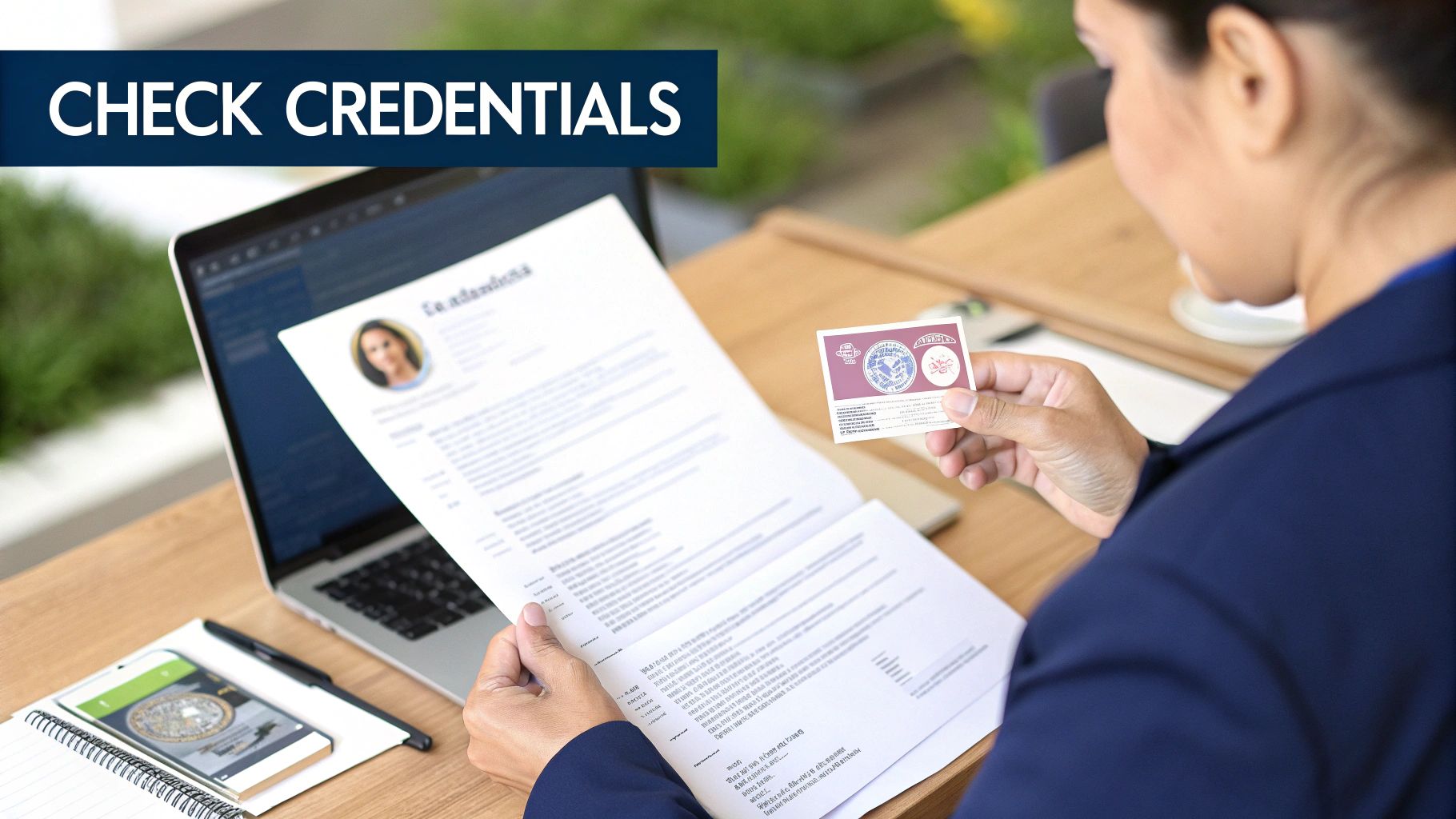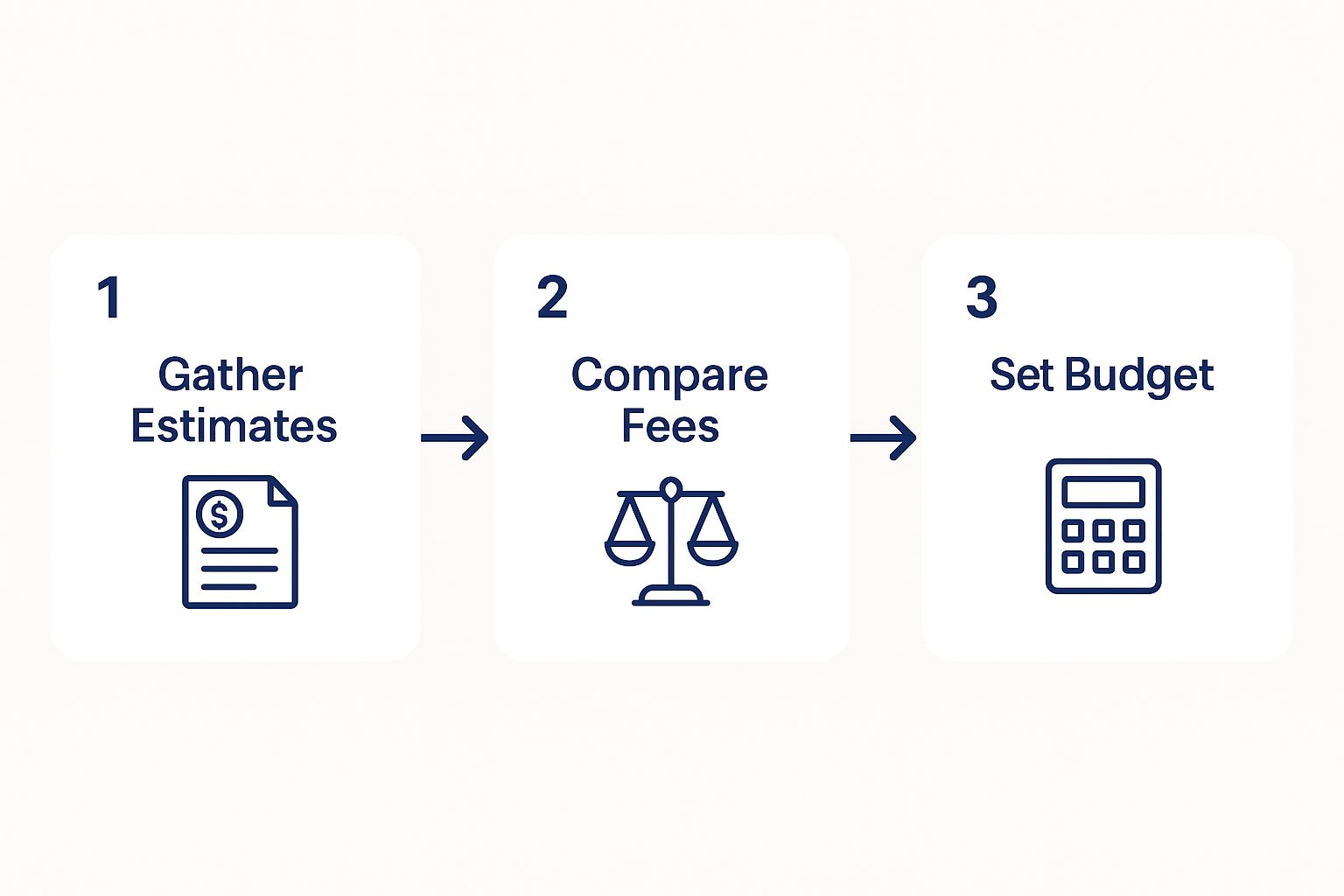How to Hire a Private Investigator: A Practical Guide from Sentry Private Investigators
- Showix technical Team
- Aug 4, 2025
- 16 min read
Updated: Aug 7, 2025
Hiring a private investigator can feel like a big step, often taken during a stressful time. But it all boils down to one simple question: what, exactly, are you trying to find out? Before you even think about picking up the phone, the most important thing you can do is get crystal clear on your objective and pull together every bit of information you already have. At Sentry Private Investigators, we find this groundwork is what makes our first conversation productive and sets your case up for success.
Getting Your Ducks in a Row Before You Call a PI

Seriously, before you start searching for an investigator, take some time to organise your thoughts. It’s the single most important part of the whole process. Having a clear goal doesn't just help us find the right specialist for your case; it also helps you manage your own expectations and, frankly, can keep your costs down.
Walking into a consultation without a clear goal is like asking a builder to construct a house without blueprints. You'll get frustrated, the investigation will be inefficient, and the final result probably won't be what you wanted. This prep work isn't just a mental checklist; it's the foundation for the entire case. A professional investigator, like our team at Sentry, needs this information to determine if we can legally and ethically help you, what it will take, and what a realistic outcome looks like.
What’s the End Goal?
First, ask yourself: what do I actually want to achieve? Be brutally specific. Are you trying to prove a suspicion you have about a partner? Find a person who’s fallen off the map? Gather solid evidence for a court case, or run a background check on a potential business partner? Each of these requires a very different set of skills and a unique approach from our team.
For instance, a case involving a potentially unfaithful partner will likely need discreet surveillance. On the other hand, finding a long-lost family member is all about deep-dive database searches, public records, and interviews. Knowing your primary objective helps us match you with an investigator who has real, hands-on experience in that specific area.
Getting this right from the start saves you from wasting time and money on firms that aren't the right fit. And with a growing market, finding that fit is crucial. The UK private investigation market is projected to be worth £520 million in 2025 – an 18% increase from the previous year. This shows just how much demand there is for specialised services. You can read more about the growth of the private detective industry in the UK if you're interested.
What Do You Already Know?
Before making that call to us, take the time to put together all the information you already have. You'd be surprised how often a seemingly tiny detail can be the key that unlocks the whole case. It gives your investigator a solid starting point, which saves them time and saves you money.
To make this easier, we've put together a simple table. Think of it as your homework before your consultation with us. Filling this out will help you walk into that first conversation feeling prepared and confident.
Your Pre-Consultation Checklist
Checklist Item | Why It's Important | Example |
|---|---|---|
Primary Objective | Defines the "win" condition for the investigation. | “I need concrete proof of my ex-partner’s cohabitation for a court hearing.” |
Key Individuals | Provides the who, what, and where for the investigator. | “John Smith, DOB 15/05/1980, last seen at 123 Any Street, Anytown.” |
Timeline of Events | Creates a narrative and highlights patterns or key moments. | “Suspicious behaviour started around March. He began staying out late on Tuesdays and Thursdays.” |
Known Locations | Gives the investigator physical places to start surveillance or enquiries. | “His office is at The Business Park, he plays football at City Sports Centre on Wednesdays.” |
Existing Evidence | Provides immediate leads and corroborating information. | “I have screenshots of suspicious text messages and a photo of the other person’s car.” |
Your Budget | Sets realistic financial boundaries for the scope of work. | “I can allocate around £1,500 for the initial phase of the investigation.” |
Going through this exercise does more than just prepare you; it turns a vague worry into an actionable plan. It shows an investigator you're serious and empowers you to have a much more focused and productive conversation from the very beginning.
How to Vet a Private Investigator

Alright, so you've got a shortlist of potential investigators. Now comes the most important part: vetting. This is where you separate the real professionals from the amateurs. It’s not about a quick look at their website; it's a deep dive into their credentials, reputation, and how they operate legally.
The private investigation industry in the UK isn't government regulated, which puts the responsibility squarely on your shoulders. Frankly, anyone can throw up a website and call themselves a PI. A true professional, however, will have no problem proving they are legitimate and committed to ethical work. At Sentry Private Investigators, we pride ourselves on our transparency and credentials.
Taking the time to do this right ensures you hire a private investigator who is not only good at their job but also operates entirely within UK law. This protects you and makes sure any evidence they find will actually be usable.
Verifying Credentials and Professional Memberships
Your first check should always be for professional affiliations. Any serious investigator or agency will belong to a respected industry body. In the UK, the gold standard is the Association of British Investigators (ABI). Membership isn't just a badge they stick on their site; it means they've passed criminal record checks, proven their skills, and are bound by a strict code of ethics.
Another absolute must-have is registration with the Information Commissioner's Office (ICO).
Any business that processes personal data—which is the core of what a private investigator does—is legally required to be registered with the ICO. This confirms they comply with GDPR and the Data Protection Act 2018. If they're not registered, they are breaking the law. End of story.
You can check an agency's status yourself on the official ICO register online. A legitimate firm will be upfront about this and happily provide their registration details. At Sentry Private Investigators, we are fully registered and transparent about our compliance—it’s key to the trust our clients place in us.
Digging into Their Online Presence and Reputation
Once the official credentials check out, it's time to see what their public footprint looks like. A professional online presence is a good sign. Look for a well-put-together website, clear contact details, and proper descriptions of what they do.
Be suspicious of sites that are vague, full of typos, or don't list a physical address. When you're checking their reputation, think about these points:
Look for Real Reviews: Don't just rely on the glowing testimonials on their own website. Search for them on Google and other independent platforms. You want to see detailed reviews where people explain their situation and how the investigator helped. A long list of generic, five-star comments with no substance can be a red flag.
Check for Case Studies: Good firms often share anonymised case studies. These are fantastic because they show you the kind of work they've handled and prove they can get results.
Gauge Their Professionalism: How do they come across online? The tone of their writing, the quality of their content, and how they present themselves all speak volumes about their professional standards.
A huge part of this is how they handle sensitive information. For any case, but especially for legal or corporate matters, their data security practices are critical. It can be helpful to start by understanding law firm data security standards, as any top-tier investigator should be operating with that same level of care.
Spotting the Red Flags
Knowing what to look for is only half the battle; you also need to know what to run from. There are some tell-tale signs that should set alarm bells ringing immediately. An investigator making over-the-top promises is one of them.
Here are some major red flags to watch out for:
Guaranteed Outcomes: No ethical PI can guarantee a specific result. Investigations are fluid and unpredictable. We promise to conduct a professional, legal investigation—not to deliver a certain outcome.
Suggesting "Shady" Methods: If an investigator mentions anything like hacking emails, tapping phones, or illegally accessing bank records, walk away. Not only is evidence gathered this way useless in court, but it could also get you into serious legal trouble.
No Formal Contract: A professional will always insist on a detailed contract or service agreement. This document protects both you and them, clearly outlining the scope of work, fees, and confidentiality clauses.
If you'd like a more detailed look at what to expect from a professional engagement, our guide on hiring a private investigator in the UK explains the whole process. Seriously, taking these vetting steps is your best defence against dodgy operators and the only way to find a credible expert for your case.
Asking the Right Questions at Your First Consultation

This first meeting isn’t just a simple chat. Think of it as your interview—a chance to really see if an investigator has the right experience and approach for your specific situation. Showing up prepared with a good set of questions is key. It helps you cut through any sales talk and get to the heart of their capabilities before you sign anything.
Anyone can ask, "how much do you charge?". To get a real feel for who you're dealing with, you need to go deeper. A true professional will welcome detailed questions and answer them with confidence. Their responses will speak volumes about their experience, their methods, and their professional standards.
Ultimately, this part of the hiring process is all about building your confidence. You need to walk away from that first meeting feeling sure you've found the right people for the job.
Do They Have the Right Experience?
First things first, you need to find out if they have direct, hands-on experience with cases just like yours. Private investigation is a huge field. Someone brilliant at corporate fraud might be completely out of their depth on a sensitive infidelity investigation, and vice-versa.
Don't be shy; get specific. A simple "Have you handled this before?" just won't cut it.
"Can you tell me about your experience with cases involving [your specific situation, e.g., finding a missing person, suspected infidelity, employee theft]?"
"What were some of the hurdles in those cases, and how did you navigate them?"
"Who exactly will be working on my case, and what’s their specific background in this area?"
That last question is especially important. For example, at Sentry Private Investigators, we always make sure the agent assigned has the most relevant skills, whether that's surveillance, digital forensics, or background checks. Any firm you consider should offer that same level of specialised service.
How Do They Actually Work?
The methods and technology an investigator uses can make or break your case. It's vital to know that they operate legally, ethically, and effectively. This is your opportunity to dig into their process.
Modern investigation is a world away from the old cliché of a man in a trench coat with a pair of binoculars. These days, UK clients benefit from some seriously advanced techniques. Our investigators use everything from GPS trackers and digital forensics to social media analysis to gather evidence. These digital tools have made surveillance and background checks far more effective, allowing PIs to pull together public records and open-source intelligence for a complete picture. You can read more about the modern private investigation industry to understand just how much has changed.
It’s crucial to ask how they guarantee all evidence is collected in a way that will stand up in court. If evidence is gathered illegally, it's not just useless—it could land you in serious legal trouble. A professional will have a clear, confident answer on how they protect the integrity of their work.
What’s the Communication Plan?
Clear, regular communication is the foundation of a good relationship with your investigator. You need to agree on how and when you'll be updated as the case develops. If your expectations don't line up with theirs, it's a recipe for frustration and stress.
Set the ground rules from the very beginning by asking:
How often can I expect an update? Will it be daily, weekly, or just when something significant happens?
How will you send these updates? Are we talking about a phone call, an email, or a detailed written report?
Who is my main point of contact?
Getting answers to these questions helps you manage your own expectations and ensures you feel in the loop, not left guessing. At Sentry, we have a clear communication process and will be happy to walk you through it, so you know exactly what to expect from start to finish.
Understanding Investigator Costs and Contracts
Let's talk about the money side of things. It’s often the first question people have, and rightly so. Hiring a private investigator is a professional service, and that comes with a price tag. But you should never feel like you're in the dark about the costs. A good investigator will be upfront and transparent, making sure you understand exactly what you're paying for.
The final bill isn't just a number pulled out of thin air. It’s directly tied to what your case needs. A simple background check on a potential employee is a world away from a complex, multi-week surveillance operation that needs a team of agents and specialised gear. Things like the complexity of your case, how many investigators are needed, and the technology involved all factor into the final cost.
The image below gives you a solid overview of the financial steps you'll take.

As you can see, the smart approach is to get estimates from a few reputable firms, compare how they structure their fees, and set a clear budget before you sign anything.
Comparing Private Investigator Fee Structures
When you start getting quotes, you'll see a few common ways investigators charge for their work. Each model has its pros and cons, and the right one for you really depends on the specifics of your situation.
Here's a quick breakdown of the most common pricing models to help you understand what you're looking at.
Fee Structure | How It Works | Best For |
|---|---|---|
Hourly Rate | You pay for the investigator's time, usually billed in increments. It's the most common model. | Surveillance, research, or any case where the total time needed is unpredictable. |
Flat Fee | A single, all-inclusive price for a specific, well-defined task. | Straightforward jobs like a background check, serving documents, or locating someone with good leads. |
Retainer | An upfront payment that the agency holds and bills against as they work on your case. | Longer, more complex investigations that require a significant commitment of time and resources. |
Understanding these options helps you compare apples to apples when you're looking at different quotes. Don't be afraid to ask an agency to explain exactly how their fees work and what is—and isn't—included.
The Contract: Your Non-Negotiable Shield
If an investigator is hesitant to give you a written contract, walk away. It's as simple as that. A professional contract, or service agreement, is your most important piece of protection. It’s not just a bit of paperwork; it's a legally binding document that lays out the entire job, protecting both you and the agency.
A proper service agreement is the hallmark of an ethical, professional investigator. It shows they are committed to being transparent and accountable, making sure everyone is on the same page about the goals, costs, and boundaries from the very beginning.
This document should be clear and easy to understand. It needs to spell out the scope of work, how payments will be handled, and the confidentiality agreement in plain English.
Make sure your contract includes these key points:
Scope of Work: A clear description of exactly what the investigator will do to achieve your objectives.
Payment Terms: A full breakdown of the fees, whether it's an hourly rate or a flat fee, the retainer amount, and how extra expenses (like mileage, court fees, or database access) will be charged.
Confidentiality Clause: A firm guarantee that everything about your case will be kept completely confidential.
Reporting Schedule: An outline of how often you'll get updates and what the final report will look like.
It's also crucial to know that your investigator is operating legally. For a better grasp of the rules they must follow, you can learn more about private investigators and the law in our guide. This will give you the confidence to review your contract and make sure you're hiring a firm that puts ethics and the law first.
What to Expect During and After the Investigation
So, you’ve signed the contract and brought a private investigator onto your team. Taking that step is a big deal, and it's completely normal to feel a mix of anticipation and anxiety about what comes next. Let's walk through what a professional investigation actually looks like, so you can feel confident and in control from start to finish.
A proper investigation isn't a one-and-done event. Think of it as a collaborative process, one built on a foundation of clear communication and trust between you and your investigator. The moment you sign on the dotted line is when the real work begins.
While the Investigation Is in Progress
With the case now active, communication is everything. You should have already agreed on how and how often you'll get updates during your initial chat. This isn't just about us keeping you informed; it's about making sure we're working as partners. Here at Sentry Private Investigators, we’ve found that transparency is the key to a successful outcome.
Your investigator will start putting the agreed-upon plan into action. Depending on your specific case, this could involve a few different things:
Surveillance: This is the cornerstone of many investigations, especially those looking into a partner's infidelity or a fraudulent insurance claim. Our agents will discreetly observe a person's activities, meticulously documenting everything with time-stamped photos and video footage.
Research and Analysis: For cases like background checks or finding a missing person, the work is less about fieldwork and more about deep-diving into records. We’ll be sifting through public databases, online footprints, and other sources to connect the dots.
Field Enquiries: Sometimes, the best way to get information is to talk to people. This is always handled ethically and legally, of course. Your identity and the nature of the investigation are never revealed.
It's also worth remembering that investigations are fluid. A new lead can pop up that changes the entire direction of the case. A truly professional investigator will keep you in the loop about these shifts, explaining exactly why a new approach is needed.
One of the biggest myths is that you'll be getting dramatic, movie-style updates every day. The reality is that a lot of investigation is simply patient, methodical observation. There might be bursts of activity followed by quiet spells as we wait for the right opportunity. That's not a sign of a problem; it's the mark of a disciplined, professional approach.
Dealing with Unexpected Challenges or Delays
Life is unpredictable, and so are investigations. Not everything goes exactly to plan. The person we’re observing might suddenly change their daily routine, or a key piece of information could be buried deeper than expected. These hurdles are just part of the job.
The real test of an agency's professionalism is how they handle these bumps in the road. A good investigator will always:
Communicate Proactively: They'll tell you about any delays or obstacles the moment they happen and explain the situation clearly. No jargon, just straight talk.
Offer Solutions: They won't just present a problem; they'll come to you with potential solutions or adjusted strategies, getting your approval before moving forward.
Manage the Budget: Any change that could impact the cost must be discussed with you first. As our guide on how much private investigators charge explains, this kind of financial transparency is non-negotiable.
After the Investigation: The Final Report
Once we’ve met the goals set out in the contract or the agreed-upon time is up, the investigation formally concludes. All of our work culminates in the final report. This isn't just a quick email summary; it's a comprehensive, professional document that lays everything out.
A high-quality report from a reputable agency will always include:
A quick recap of your original objectives.
A chronological log of every action we took.
All the evidence we gathered, like time-stamped images, video files, and copies of important documents.
A clear, factual summary of our findings, free of any personal opinion or guesswork.
This report is yours to keep. It's a clear, objective record, presented in a way that is admissible in court, should you need it. Ultimately, it provides the answers you were looking for when you first decided to hire a private investigator, giving you the clarity to decide what to do next.
Answering Your Final Questions About Hiring a Private Investigator
Even after you've done all your research, that moment before you actually commit to hiring a private investigator can feel a little daunting. It's a big step, and having a few last-minute questions is completely normal. In fact, it’s a good sign—it means you're taking this seriously.
To help you feel confident in your decision, let's walk through some of the most common queries people have right before they pick up the phone. Getting these sorted will give you the peace of mind you need to move forward.
Is It Actually Legal to Hire a Private Investigator in the UK?
Yes, absolutely. Hiring a private investigator in the UK is perfectly legal, provided you work with a professional agency that understands the rules. Here at Sentry Private Investigators, we operate within a strict legal and ethical framework. Our work is bound by UK laws covering privacy, data protection (like GDPR), and surveillance (specifically, RIPA).
A reputable PI will never suggest or perform illegal acts. Things like hacking emails, tapping phones, or trespassing are the stuff of movies, not professional investigations. Any evidence gathered that way is useless in court and could land both you and the investigator in serious legal trouble.
Our job is to find what you need to know using entirely lawful methods. This typically involves:
Discreet Surveillance in public spaces where there's no expectation of privacy.
Public Record Searches to uncover official information like property ownership or court records.
Open-Source Intelligence (OSINT), which is a fancy term for expertly analysing information that's already publicly available online.
Ethical Human Intelligence, which means conducting interviews or making discreet enquiries with people who might have information.
The entire point is to get you actionable intelligence without ever stepping over a legal or ethical line.
So, What Does a Private Investigator Really Do Day-to-Day?
At its heart, a private investigator's job is to uncover facts and gather information for a client. That client could be an individual, a law firm, or a large corporation, and the tasks can vary dramatically from one case to the next.
On any given day, our team could be handling a huge range of assignments. One investigator might be conducting covert surveillance to see where someone is going and who they're meeting. Another could be running deep background checks on a potential business partner, while a third might be tracing a long-lost family member. We also regularly support legal cases by serving court documents or gathering crucial evidence. It's a blend of old-school fieldwork, modern tech, and sharp analytical skills, all aimed at giving you a clear, evidence-based picture of what’s really going on.
A common myth is that PIs operate in the shadows, bending the rules to get dramatic results. The reality is far more methodical. It's about patient, lawful information gathering. The end result isn't a tense confrontation, but a detailed, factual report that gives you the truth.
How Can I Be Sure the Investigation Stays Confidential?
Confidentiality isn't just a selling point; it’s the absolute foundation of our profession. Discretion is everything. Any good investigator is bound by a strict code of ethics and UK data protection laws, which legally require them to keep all client and case information completely private.
This guarantee should be spelled out clearly in your contract or service agreement. Before you sign a thing, ask the investigator to explain their confidentiality policy. How do they store digital files? How will they communicate with you securely? What happens to the case materials once the investigation is over?
Your best protection is choosing an established agency with a solid track record. Our reputation at Sentry Private Investigators is built on our clients' trust, and we take protecting your privacy incredibly seriously.
What Kind of Report Will I Get at the End?
When the investigation wraps up, you won’t just get a quick text message. You should expect a detailed, professional final report. This is a formal document that lays out everything that was done on your behalf.
A proper report from a professional agency like Sentry Private Investigators will typically include:
A clear summary of the initial objective and the final outcome.
A detailed log of all activities, complete with dates and times.
All the evidence gathered. This could be time-stamped photos, video clips, surveillance logs, or copies of public documents.
A factual, objective summary of the findings, without opinion or speculation.
The report is written to be clear, concise, and easy for you to understand. It’s also structured to ensure the evidence is properly documented, making it suitable for use in legal proceedings if needed.
At Sentry Private Investigators, we know that deciding to hire a professional is a significant decision. We’re committed to providing discreet, ethical, and effective services to give you the clarity and peace of mind you deserve. If you have more questions or are ready to discuss your situation, please get in touch for a confidential consultation.





Comments